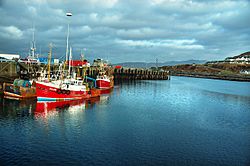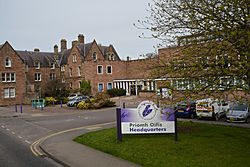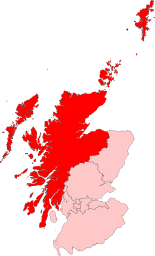Highlands and Islands Alliance facts for kids
Quick facts for kids
Highlands and Islands Alliance
Càirdeas
|
|
|---|---|
 |
|
| Leader | Lorraine Mann |
| Founded | Autumn 1998 |
| Dissolved | 24 August 2004 |
| Headquarters | Midoxgate House Fearn, Ross-shire IV20 1RP |
| Ideology | Localism Regionalism Soft Euroscepticism |
The Highlands and Islands Alliance, also known as Càirdeas, was a small political group in Scotland. It was active in the late 1990s. This group was started in the autumn of 1998 by local politicians who didn't belong to any big party. They only took part in the first ever Scottish Parliament election in 1999.
They didn't get many votes, only about 1.3% in their region. Even though they had a good campaign, none of their candidates won. The Alliance was led by Lorraine Mann, an activist who was against nuclear power. The group wanted to speak up for people in rural parts of Scotland. They felt these areas were often ignored by the government. They believed the government focused more on the busy Central Belt area.
The Alliance mostly focused on local issues and problems in the countryside. They only ran in a special part of the election called the additional member system. This allowed people to vote on national issues through their local ballot. After the election, the group didn't do much politically. It officially closed down in August 2004.
Even though they didn't win elections, the Alliance became well-known for trying to allow political job sharing in the Scottish Parliament. This means two people could share one job as a Member of Parliament. Their legal fight got a lot of attention from the media and experts. This case later helped shape discussions about new laws in the Northern Ireland Assembly and the British House of Commons.
Contents
History of the Alliance
How the Alliance Started
The Scottish Parliament was created after a vote in 1997. The Highlands and Islands Alliance was formed in late 1998. Local activists started it. They wanted to "create a strong, independent voice" for their region. This was to prepare for the first Scottish Parliament election in 1999.
They felt that the Central Belt in the Scottish Lowlands got too much attention from the government. This meant rural areas were often forgotten. The group also believed that people in the Highlands and Islands had "the lowest incomes and highest taxes in the UK." They saw the new parliament in Holyrood as a chance to make their region's voice heard. They hoped Holyrood would not just be a smaller version of the government in Westminster.
Important people in the Alliance included writer Edwin 'Eddie' Stiven and local Councillor Bryan Beattie. The group's only leader was Lorraine Mann. Before leading the Alliance, Mann successfully fought against nuclear reprocessing at Dounreay. She also led a group called Scotland Against Nuclear Dumping.
The Alliance officially registered with the Electoral Commission on February 25, 1999. Bryan Beattie was in charge of nominations and was also the treasurer. Lorraine Mann was the leader. The group had about 280 members. Their main office was in a building called Midoxgate House in Fearn. Even before they were officially registered, the group became quite well-known. They were interviewed by The Guardian newspaper. In these interviews, they said they planned to run in the election. They also said that politicians from the Highlands were not connected enough to their local areas.
Running in the Election
The Alliance ran an active campaign for the parliament. They sometimes called themselves Càirdeas. This is a Scottish Gaelic word meaning "friendship, fellowship, relationship, goodwill, and alliance." Their efforts got attention from news outlets like BBC News and The Economist.
Leader Lorraine Mann also took part in a debate about land reform in April. Despite getting some media attention, the party had a "disappointing" result in the election on May 6, 1999. They received 2,607 votes. This was only 1.3% of the votes in the Highlands and Islands electoral region. The group did not run in the local first-past-the-post elections. This meant supporters could vote on national issues as they wished.
At one point, some people thought the Alliance might win a seat. However, all their candidates were defeated. One candidate was Arthur Cormack, a well-known Scottish singer. After the election, the group stopped being active in politics. They were officially removed from the Electoral Commission's list on August 24, 2004.
What the Alliance Believed In
Journalist James Cusick said the Alliance had a "radical edge." This means they had strong, new ideas, like the Highland Land League from a century ago. Even though they weren't officially linked to a specific party, they were supported by Democratic Left Scotland. This group wanted to bring new socialist ideas to the Scottish Parliament.
Main Ideas and Plans

Lorraine Mann said the group was promoting "positions rather than policies." This meant their representatives wouldn't have to vote a certain way based on party rules. Instead, any Member of the Scottish Parliament (MSP) from the Alliance would ask their local voters how to vote. They planned to do this using the internet, like E-Mail. They called this a new type of "community democracy."
The Alliance had detailed plans for the Highlands and Islands. They believed the region's unique voice should be heard. Edwin Stiven wrote a paper called The Problems, in Fishing, Aquaculture, and the Marine Environment. In it, he suggested that fisheries in western Scotland should be free from European Union (EU) rules. He wanted them to be fully owned by the local community. He also suggested they be managed by sea trusts, similar to those for crofts. The Alliance also wanted more money from the EU for "communities which have found themselves on the periphery of investment."
For Scotland, the group wanted to spread out government funding to create lasting jobs. They also wanted a separate Scottish agricultural policy. This policy would focus on land reform and giving land back to people. They felt that current funding plans for the Highlands and Islands didn't work well because there weren't many big businesses. Instead, they suggested creating a local Highland bank. Their social plans also focused on communities. They supported affordable basic services and keeping rural schools open, especially preschools.
The Alliance also suggested a non-lawmaking assembly. In this assembly, all local politicians (MPs, MEPs, and MSPs) would meet. They would discuss plans with their local voters. The group also wanted a group to watch over local public services and other organizations.
For transport, they suggested:
- Stopping tolls on the Skye Road Bridge.
- Making the region's ferry network better.
- Lowering prices for local public transport.
- Starting a community-owned airline.
These ideas were part of their "Right to Move" plan.
Nationally, the Alliance supported lowering student tuition fees and keeping British student grants. When it came to whether Scotland should stay in the United Kingdom, they were neutral. They simply said, "a Scotland which is treated fairly is more likely to want to stay within the union." The Alliance also supported the Scottish Gaelic language.
Job-Sharing Idea

The Alliance is perhaps most famous for their idea of job-share candidates. They suggested this so that if they won a seat, the politician wouldn't have to be away from their rural home for more than a week. This is because they could switch with their job-sharing partner. The Alliance was the first British political party to have an equal number of men and women among its 20 candidates. Even though each Alliance seat would have two MSPs, the group said they would share one salary and expenses.
The idea of job-sharing was first accepted by the Highland Council's election official, Arthur McCourt, in April 1999. This happened after a four-month disagreement between the Alliance and the Council. However, it turned out McCourt didn't know about the job-share part. He then said the nominations were not valid. Lorraine Mann successfully took the case to a special court called an employment tribunal. The group still fought the election with their job-sharing idea. However, some experts believe that the earlier legal problems with their idea made them less popular. The legal support for job-sharing candidates was later overturned in December 2000. The court ruled that the tribunal system couldn't decide on election laws.
With advice from the group New Ways To Work, Mann took the case to another tribunal. This time, she argued it was sex-discrimination in November 2001. But the Council's decision was still upheld. This case has since been mentioned in research papers by the Northern Ireland Assembly and the British House of Commons. It helped inform discussions about the Sex Discrimination (Election Candidates) Act 2002.
Election Results
Scottish Parliament Election 1999
| Electoral region | Number of votes | % of regional vote | % of national vote | Regional position | National position | Outcome |
|---|---|---|---|---|---|---|
|
|
|
|
|
|
|
No seats |
|


